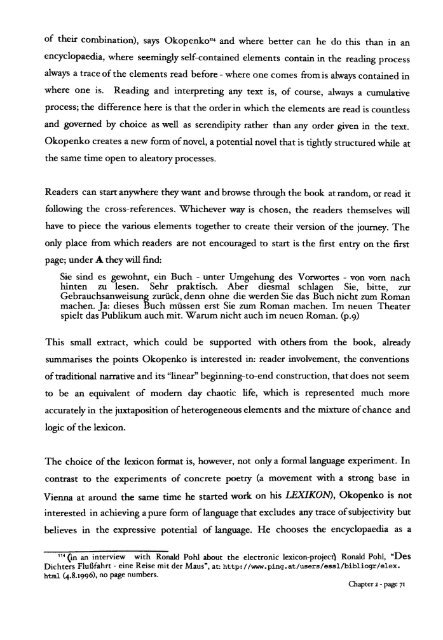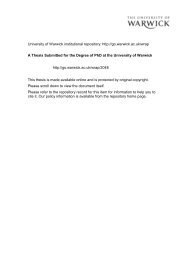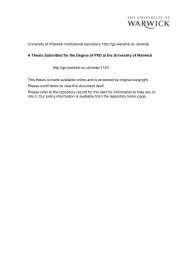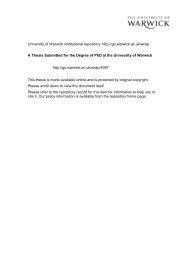From Page to Screen - WRAP: Warwick Research Archive Portal ...
From Page to Screen - WRAP: Warwick Research Archive Portal ...
From Page to Screen - WRAP: Warwick Research Archive Portal ...
Create successful ePaper yourself
Turn your PDF publications into a flip-book with our unique Google optimized e-Paper software.
of their combination), says Okopenko'< and where better can he do this than in an<br />
encyclopaedia, where seemingly self-contained elements contain in the reading process<br />
always a trace ofthe elements read before - where one comes from is always contained in<br />
where one is. Reading and interpreting any text is, of course, always a cumulative<br />
process; the difference here is that the orderin which the elements are read is countless<br />
and governed by choice as well as serendipity rather than any order given in the text.<br />
Okopenko creates a new form ofnovel, a potential novel that is tightly structured while at<br />
the same time open <strong>to</strong> alea<strong>to</strong>ry processes.<br />
Readers can start anywhere they want and browse through the book at random, or read it<br />
following the cross-references. Whichever way is chosen, the readers themselves will<br />
have <strong>to</strong> piece the various elements <strong>to</strong>gether <strong>to</strong> create their version of the journey. The<br />
only place from which readers are not encouraged <strong>to</strong> start is the first entry on the first<br />
page; under A theywill find:<br />
Sie sind es gewohnt, ein Buch - unter Umgehung des Vorwortes - von vom nach<br />
hinten zu lesen. Sehr praktisch. Aber diesmal schlagen Sie, bitte, zur<br />
Gebrauchsanweisung zuriick, denn ohne die werden Sie das Buch nicht zum Roman<br />
machen. Ja: dieses Buch miissen erst Sie zum Roman machen. 1m neuen Theater<br />
spielt das Publikum auch mit. Warum nicht auch im neuen Roman. (P.9)<br />
This small extract, which could be supported with others from the book, already<br />
summarises the points Okopenko is interested in: reader involvement, the conventions<br />
oftraditional narrative and its "linear" beginning-<strong>to</strong>-end construction, thatdoes not seem<br />
<strong>to</strong> be an equivalent of modern day chaotic life, which is represented much more<br />
accurately in the juxtaposition ofheterogeneous elements and the mixture ofchance and<br />
logic ofthe lexicon.<br />
The choice of the lexicon format is, however, not only a formal language experiment. In<br />
contrast <strong>to</strong> the experiments of concrete poetry (a movement with a strong base in<br />
Vienna at around the same time he started work on his LEXIKON), Okopenko is not<br />
interested in achieving a pure form oflanguage that excludes any trace ofsubjectivity but<br />
believes in the expressive potential of language. He chooses the encyclopaedia as a<br />
114 (in an interview with Ronald Pohl about the electronic lexicon-project) Ronald Pohl, "Des<br />
Dichters Flu6fahrt - eine Reise mit der Maus", at: http://www.ping.at/users/essl/bibliogr/elex.<br />
html (4.8.1996), no page numbers.<br />
Chapter 2 - page 71





